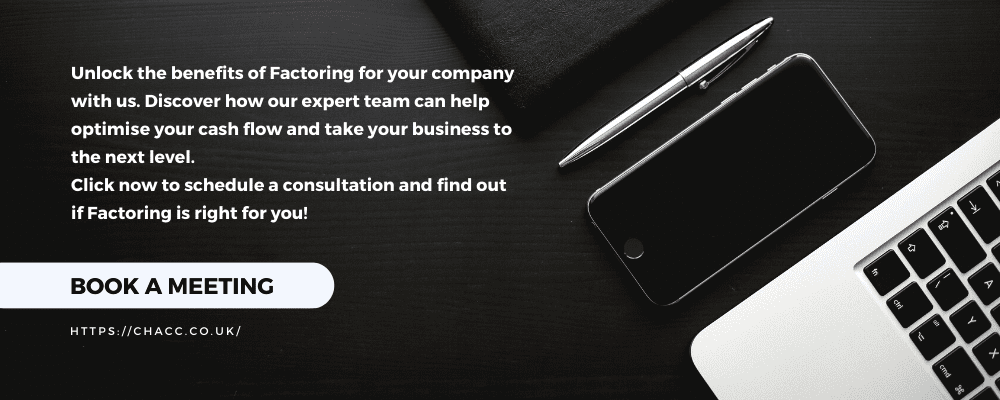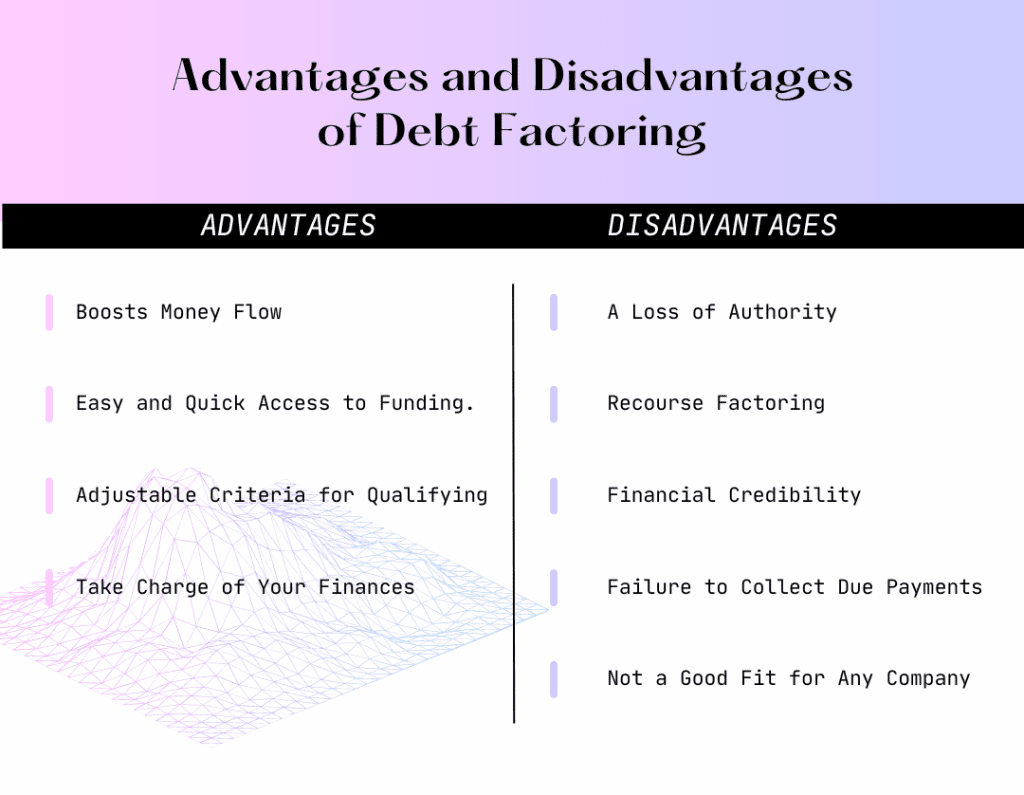Businesses are sometimes left with customer debt that needs to be cleared urgently to meet business cash flow needs, and things such as credit control, financing, and effective financial management do not help fast enough. How do you clear this debt urgently? Do you track your customers down and force them to pay through legal threats? Only to realise that the customer not paying might be your largest or most profitable customer? If so, it can negatively impact your plans to expand or grow your business or even retain certain customers. Is there any other way to get these bills paid without initiating a protracted and expensive legal battle? Have you considered factoring as an option?
Managing a company’s finances successfully often calls for out-of-the-box thinking. You may need to search elsewhere for financial security if you operate in an industry where seasonal sales fluctuations and intense competition are the norms. The good news is that you can look into alternative possibilities. That’s where the concept of factoring enters.
For many companies, factoring presents an opportunity and an efficient method of keeping cash flowing.
Smart Financial Planning for Sustainable Business Growth
What Is Debt Factoring?
Accounts Receivable Financing, Invoice Discounting, Debt Factoring, and Commercial Finance are all names for factoring. Factoring is a method through which a business reduces its debt capacity by selling its unpaid accounts receivables to a third party(factoring provider), who pays for them instantly for a fee or buys them at a discounted rate.
Invoicing is very important for taxation purposes, and any deviation from the requirements set by HMRC can result in fines and penalties. Therefore, it’s important to understand what to include in an invoice.
Types of Factoring
There are several forms of factoring to leverage unpaid invoices to alleviate cash flow issues.
Dual factoring: Recourse and Non-recourse
Before agreeing to finance your clients’ invoices, factoring companies do a lot of research on the debt to be sure that your clients will pay in full.
When using recourse factoring, if your consumer doesn’t clear their debt, you will be liable for repaying the factoring business the money they gave you.
In recourse factoring, the company receives a percentage of the debt from the factor; the factor then collects the debt and pays the remaining amount once the full amount is successfully collected.
Spot-factoring
A company might only factor as and when required, in spot factoring a company can sell their unpaid invoices to a spot factoring provider as a one off for a quicker payment. In this method the company can select which invoices to sell as part of the spot factoring.
Reverse factoring
Supply-chain financing (or Reverse Factoring) is a process in which a third party, usually a bank, acts as an intermediary between the buyer and the seller.
It is always recommended to speak to your Accounting Firm to understand the potential impact on your accounting, tax and long term business position before making any major finance or cash flow decisions.

How Factoring Works?
When your company delivers a service to a customer and issues an invoice to the client for the work done, the invoice becomes payable. If the invoice remains unpaid, or the payment terms are not ideal, the company can apply to a factoring firm to negotiate terms under which these unpaid invoices can be sold to the factor. The factoring terms decide how the debt is collected and how much is paid for the unpaid invoice.
Debt Factoring Advantages and Disadvantages

Advantages of Debt Factoring
Boosts Money Flow
Debt factoring is a way to improve your company’s cash flow by obtaining the money owed to you from your invoices before your customers pay.
With this financing, you can use the funds for operational expenses and future investments. You may use this money to pay regular bills to invest in a promising new venture.
Easy and Quick Access to Funding
Invoice factoring services sometimes advance funds from unpaid bills in as little as 24 hours. Debt factoring may deliver cash quicker than certain business loans; however, the exact timeframe will depend on the firm you partner with and its application procedure.
Adjustable Criteria for Qualifying
Debt factoring may be more straightforward than other forms of company funding. Factoring firms emphasise the trustworthiness and notoriety of your clients more than conventional business loan providers, which means that new enterprises and those with poor credit may still be eligible.
In addition, the factoring company typically only demands extra physical collateral since the invoices secure the funding. It is beneficial for younger businesses that may still need significant assets to offer investors because of this protection.
Take Charge of Your Finances
When you have outstanding customer payments, it distorts your company’s financial image. When these payments don’t materialise after being anticipated and accounted for, it may throw your finances into a loop.
You may change your finances by selling unpaid bills to a factoring firm at a discount. In addition to facilitating stable cash flow, equity, and liquidity, factoring may assist in financing. You may immediately start addressing cash flow issues caused by outstanding debts once you get the money from selling the invoices.
Maintain a Favorable Financial Reputation
Unpaid invoices may devastate a company’s financial standing, especially if they pile up over a year due to a few highly demanding customers or projects. A lack of a good credit history might lead to insolvency and make it difficult to approve a credit card.
Many of these issues may be mitigated by the use of factoring. It won’t fix problems, but the harm to your business’s image will be significantly less severe.
Disadvantages of Debt Factoring
Although it might get you out of a jam by giving you access to cash quickly and enhancing your cash flow, factoring has its pitfalls that you should be aware of.
To factor in is to give up management of your own money. You are outsourcing collecting payments by issuing invoices to another company. Because of this, your relationship with your customers may suffer.
Customers who have yet to pay an invoice may feel slighted if you use a factoring company to pursue payment on their behalf since they may take a stricter stance than you would. Your actions may turn off this consumer and lead to negative word of mouth about the business you can’t control.
Recourse Factoring
Before committing to recourse factoring, give it some thought. As was previously noted, if the customer does not pay the factoring business, you will be held responsible under a recourse factoring agreement.
Financial Credibility
Although factoring might help you balance your accounts in time for tax season, it may damage your reputation in the long run. When invoicing is outsourced instead of collected, it signals to customers that your company may need help collecting payments on time.
This might cause financial institutions to view your company with scepticism and lower their ratings of you. Credit card applications may also see decreased limits.
Failure to Collect Due Payments
It might be unsettling for company owners to give up collections management to an outside entity. Concerns about damaging client relationships are understandable, mainly if the factoring company’s plan for recovering money is not made explicit.
An individual may verify the legitimacy and morality of a factoring firm by doing some preliminary investigation. Invoice finance is an alternative to outright outsourcing your accounts receivable if you’re still uncomfortable with giving up control of your money.
Not a Good Fit for Any Company
Since invoicing is a standard business, debt factoring is a viable solution for B2B firms. In contrast, this form of funding is off-limits to other types of enterprises.
Direct-to-consumer businesses that need quick cash may have to go elsewhere for financing.

How To Select a Factoring Organisation?
When choosing a lender, keep in mind the following if you’re thinking of using invoice factoring as a means of securing company financing:
- Field of Expertise
Most factoring firms focus on serving a particular sector of the economy or a given range of company sizes. Identify a service that can cater to your specific business requirements.
- Low Interest
Invoice factoring interest rates may be quite expensive, so do your research to ensure you’re getting the best deal possible from any prospective factoring firms.
- Advancing Frequently
The factoring company will only advance a certain percentage of the invoice total. Employ the services of a factoring firm that gives you access to the maximum amount of your money as soon as it is available.
- Management of Invoices Online
You should be able to submit new invoices for factoring and monitor the status of already factored ones via your online account with a reputable factoring company.
- Few Extra Costs:
It’s essential to check for hidden fees to avoid any unpleasant surprises.
- Quick Source of Funding:
You should expect a factoring company to release your funds within a couple of business days.
- Simplicity in Re-Enrollment:
The process of factoring extra invoices should be simple when you and your customer have agreed to engage with a factoring provider.
Is Debt Factoring Good for My Business?
Debt factoring may be a functional short-term financing solution for business-to-business (B2B) enterprises to free up capital stuck in outstanding bills. This funding option might aid in managing cash flow, paying for operating expenditures, or expanding your firm.
Debt factoring meaning is “an alternative funding strategy for startups and enterprises with poor credit that relies on collecting overdue bills.”
It is a costly alternative if you need cash quickly but can wait for your clients to pay. For this reason, your company’s best advantage is to get a low-interest commercial mortgage if such a thing is possible.
Invoice Factoring vs. Invoice Financing: What’s the Difference?
There are some similarities between invoice finance and factoring, but there are also important distinctions. Invoice financing entails submitting an application to a lender and receiving permission to borrow money against specific invoices.
A firm that uses invoice financing is still liable for collecting the money owed to it. Following this, you may use the money toward paying off the loan and any associated fees and interest. When you’ve paid back the first loan, consider borrowing against future bills.
However, when you use invoice factoring, you are essentially selling your bills to a factoring business.
The following are some further distinctions between invoice financing and factoring:
- The Value of Credit
An essential factor in invoice financing is the financial stability of your company. Customer creditworthiness is of utmost importance in factoring.
- Accountability For Payments
The factoring company will collect and pay any outstanding bills assigned to them by your company. The loan is repaid using the money you get from gathering the statements.
- Reborrowing
The standard practice in invoice finance is to pay back any loans taken out before taking out new ones. No matter how many loans your company has, you can consider bills already issued to your authorised customer firms.
Therefore, factoring is comparable to the underwriting procedure for traditional loan products, whereas invoice finance is more akin to the underwriting process for borrowing money against future earnings.

Conclusion
For firms that meet the requirements, invoice factoring may be a quick and straightforward way to get the capital you need. However, the interest rates on factoring loans are often higher than those on other business loans.
Nonetheless, if you find yourself in this position, you should do everything possible to maximise the positive outcomes for yourself and your company. Knowing the advantages and disadvantages, you can make a better choice, particularly when choosing a factoring business.









































































